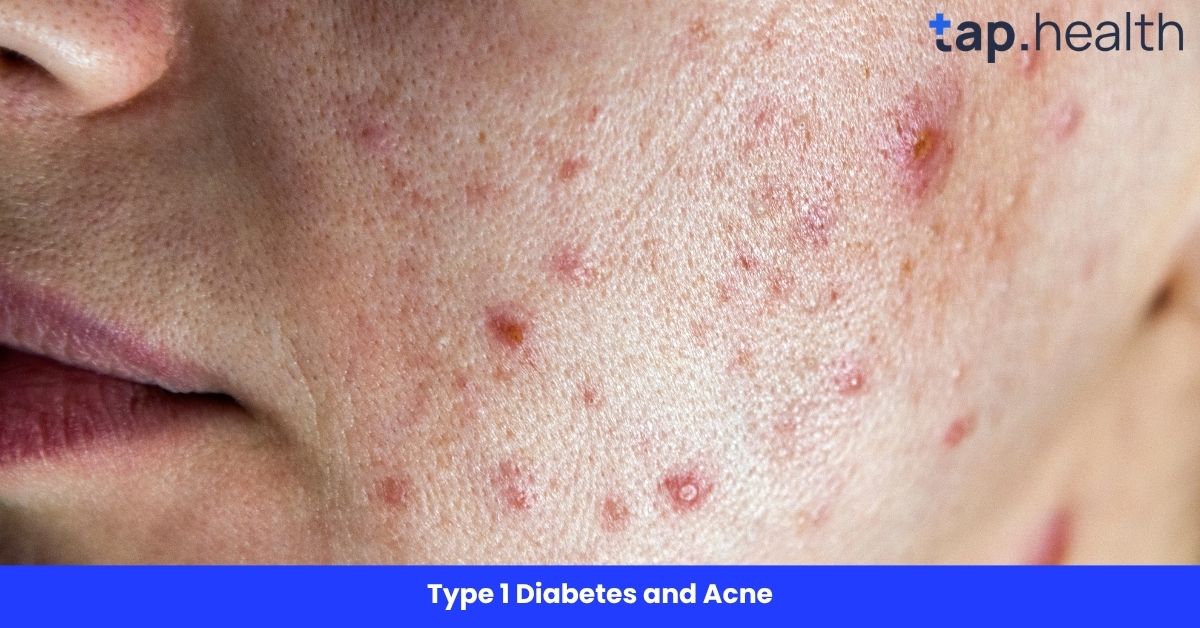Type 1 diabetes is a chronic condition that occurs when the body’s immune system mistakenly attacks and destroys the insulin-producing cells in the pancreas. Insulin is crucial for regulating blood sugar, and without it, people with type 1 diabetes struggle to maintain normal blood sugar levels. Alongside managing blood sugar, many people with type 1 diabetes also face another common issue—acne.
Acne is typically associated with hormonal changes, diet, and skin care routines. However, for individuals with type 1 diabetes, the relationship between acne and diabetes can be more complex. In this comprehensive guide, we will explore how type 1 diabetes and acne are connected, why this connection exists, and what steps can be taken to manage acne when living with type 1 diabetes.
What Causes Acne in People with Type 1 Diabetes?
1. High Blood Sugar Levels
The most significant connection between type 1 diabetes and acne is elevated blood sugar levels. When blood sugar levels are high (hyperglycemia), the body produces more insulin in an attempt to compensate. This increased insulin can lead to higher sebum (oil) production in the skin’s sebaceous glands. Excess oil combined with dead skin cells can clog pores, leading to acne outbreaks.
2. Insulin Resistance
In some cases, even though individuals with type 1 diabetes typically don’t have the same degree of insulin resistance as those with type 2 diabetes, they may still experience some level of insulin resistance. Insulin resistance occurs when the body’s cells become less responsive to insulin. This can affect the skin’s ability to regenerate and heal, resulting in acne.
3. Stress and Hormonal Imbalance
Managing type 1 diabetes can be stressful, and stress can trigger the release of hormones like cortisol. Increased cortisol levels can increase oil production in the skin, leading to clogged pores and, eventually, acne. Additionally, fluctuations in blood sugar levels can cause hormonal imbalances, which can also contribute to acne development.
4. Medications and Treatments
People with type 1 diabetes often need to take various medications to control blood sugar levels. Some medications, such as corticosteroids, can cause side effects like acne. If you’re using insulin therapy or other drugs to manage diabetes, it’s essential to discuss any skincare concerns with your healthcare provider.
How Does Type 1 Diabetes Affect Skin Health?
1. Dry Skin and Dehydration
One of the common complications of type 1 diabetes is dry skin. High blood sugar levels can lead to dehydration, which, in turn, makes the skin drier and more prone to irritation. Dry skin is often an underlying factor that contributes to acne, as it may lead people to overcompensate with harsh skincare routines or products that can irritate the skin and cause breakouts.
2. Slow Healing Process
Due to high blood sugar levels, wounds and cuts take longer to heal in people with type 1 diabetes. This includes acne-related scarring. Even mild acne can result in long-lasting marks if not properly treated. People with diabetes may also have reduced circulation, further slowing down the healing process.
3. Increased Risk of Infections
When acne is not adequately managed or treated, it can become infected. For individuals with type 1 diabetes, infections are a serious concern because the body’s ability to fight infections is often weakened by high blood sugar. An infection in acne-prone areas can make the condition worse, and more severe breakouts could occur.
Can Type 1 Diabetes Cause Acne in Teenagers?
Yes, teenagers with type 1 diabetes may be more likely to experience acne. This is because adolescence is a period when hormonal changes are at their peak, which already increases the likelihood of acne. In addition, managing blood sugar levels can be challenging for teenagers, and any fluctuations in insulin or sugar levels can make acne worse.
The combination of these factors means that teenagers with type 1 diabetes may experience more frequent or severe acne compared to their peers who do not have diabetes.
How Can You Prevent and Manage Acne with Type 1 Diabetes?
1. Control Your Blood Sugar Levels
The most important step in preventing acne for individuals with type 1 diabetes is maintaining stable blood sugar levels. By keeping your blood sugar within the target range recommended by your doctor, you can reduce the chances of triggering acne. Regular monitoring of blood sugar, following a balanced diet, and taking insulin as prescribed can help achieve this.
2. Choose the Right Skincare Products
People with type 1 diabetes should be cautious when selecting skincare products. Harsh or overly drying products can aggravate dry skin and lead to further acne breakouts. Instead, look for gentle, non-comedogenic (won’t clog pores) products that are designed for sensitive skin. Cleanse your skin twice a day with a mild face wash and use a moisturizer that doesn’t contain harsh chemicals.
3. Avoid Touching Your Face
One of the easiest ways to prevent acne is to avoid touching your face. The hands carry bacteria, oils, and dirt, all of which can transfer to your skin and clog pores. This can worsen acne. Additionally, if your hands are not clean, touching your skin could introduce more bacteria and increase the risk of infection.
4. Maintain a Healthy Diet
Diet plays a significant role in managing type 1 diabetes and acne. While there is no direct link between sugar and acne, consuming a balanced diet rich in fruits, vegetables, whole grains, and lean proteins can help regulate blood sugar levels. Also, drink plenty of water to keep your skin hydrated and reduce dryness that could contribute to acne.
5. Use Topical Treatments for Acne
Over-the-counter acne treatments such as benzoyl peroxide, salicylic acid, or retinoids may be effective in treating acne. However, before using any acne treatment, consult your dermatologist or healthcare provider, especially since certain products may interact with medications for diabetes. Be cautious and avoid products that could irritate the skin further or worsen other skin issues.
6. Stay Hydrated
Drinking water throughout the day helps keep your skin hydrated and supports overall health. Proper hydration can help manage the dryness caused by type 1 diabetes and prevent the skin from becoming too dry, which could lead to acne.
Real-Life Scenario
Consider a teenager diagnosed with Type 1 Diabetes who experiences frequent acne breakouts. Despite using over-the-counter acne creams, the results remain inconsistent. After consulting a dermatologist and endocrinologist, the teen learns that uncontrolled blood sugar was increasing skin oil production and inflammation. Once insulin therapy and diet were better managed, acne visibly improved.
Expert Contribution
Dermatologists and endocrinologists agree that poorly controlled blood glucose can make acne worse. High blood sugar increases insulin levels, which in turn can raise androgen hormone activity — leading to more oil production and clogged pores.
Experts recommend using non-comedogenic (oil-free) skincare products and maintaining good glycemic control. They also suggest that lifestyle factors like adequate hydration, a low-glycemic diet, and stress management can make a noticeable difference.
Recommendations Grounded in Proven Research and Facts
- Maintain stable blood sugar: Research shows that stable glucose levels reduce inflammation, which helps prevent acne flare-ups.
- Choose a low-glycemic diet: Foods like whole grains, vegetables, and lean proteins lower the risk of hormonal acne.
- Use gentle skincare products: Avoid harsh cleansers and oily creams; opt for mild, non-comedogenic formulas.
- Consult both specialists: Working with a dermatologist and endocrinologist ensures treatment addresses both skin and hormonal aspects.
- Stay hydrated and manage stress: Proper hydration and stress reduction support overall skin health.
Frequently Asked Questions (FAQs) on Type 1 Diabetes and Acne
Q1: Does insulin cause acne?
Insulin therapy can sometimes contribute to acne in people with diabetes, especially if blood sugar levels are not well controlled. Elevated insulin levels in the body can lead to increased oil production in the skin, which may clog pores and lead to acne. Proper blood sugar control and skincare routines can help mitigate this risk.
Q2: Is acne more common in people with type 1 diabetes?
While acne is not exclusive to people with type 1 diabetes, it can be more common and severe due to factors like hormonal changes, high blood sugar levels, and the use of certain diabetes medications. However, acne is treatable with proper skincare, medication, and blood sugar management.
Q3: Can managing my blood sugar levels help reduce acne?
Yes, controlling your blood sugar levels can significantly help in managing acne. Stable blood sugar levels prevent insulin spikes that could trigger acne. By keeping your blood sugar in check, you reduce the risk of excessive oil production and clogged pores.
Q4: What is the best skincare routine for someone with type 1 diabetes?
A gentle skincare routine is best for individuals with type 1 diabetes. This should include using a mild face wash, a non-comedogenic moisturizer, and acne treatments if needed. Avoid harsh scrubbing or irritating products, as they can exacerbate acne and dry skin.
Q5: Can stress make acne worse in people with type 1 diabetes?
Yes, stress can lead to higher cortisol levels, which in turn increases oil production in the skin and can lead to acne. Stress management techniques, such as meditation, exercise, and good sleep, are essential in both managing blood sugar levels and preventing acne.
Conclusion
Type 1 diabetes can have a significant impact on skin health, and acne is a common concern for many people with the condition. While the causes of acne in individuals with type 1 diabetes are multifactorial, they often stem from factors like high blood sugar, hormonal changes, medications, and skin dehydration. By managing blood sugar levels, following a gentle skincare routine, and maintaining a healthy lifestyle, individuals with type 1 diabetes can minimize the risk of acne and improve their skin health.
Remember to consult with a healthcare provider or dermatologist to tailor a skincare routine that works best for you. With the right approach, it’s entirely possible to manage both type 1 diabetes and acne effectively.



